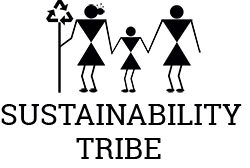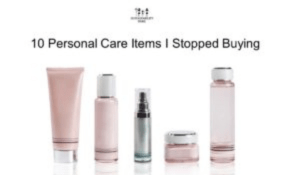Tribe, have you noticed that we expose ourselves to how many chemicals through personal care products? Worst is we even expose our babies to the toxins in the name of hygiene. I have seen people resist their kids playing in the dirt, on the other hand, bombard them constantly with cleaning products thinking they are protecting their kids. Unfortunately, it has become a vicious cycle of our times. People get sick because of pollution. Most of the respiratory and skin problems arise due to polluted air and water and then we use more and more cleaning products. The application and manufacturing of cleaning products actually add up the pollution of water and air.
As part of my zero waste lifestyle and mainly when I became the mother, I started giving more attention to this topic of healthy, non-toxic personal care products. Back then there were fewer options of non-toxic, organic products, and a few places where I can shop such products package-free.
So partly I depended on memory, remembering my grandmother and mother’s DIY recipes and rest I figured out on my own, thanks to the availability of huge information and other people’s experiences on the internet. But before heading to the list of items I stopped buying, let’s see if we really need so many products for a clean and healthy lifestyle?
Do we need those many toiletries and cosmetic products?
If you are above 30 years old then I am sure you all will agree that when we were kids, our toiletries and cosmetics list was much shorter. Our families used to buy some standard items and that’s all. Now if you are buying these things for the whole family then you need to visit separate aisles for every family member his, her, and children’s or even separate stores at times. Yes, the business of cleaning up and looking good has become huge, many niche products are coming up and hitting the stores almost every week. But in reality, do we need them all?
I mean, one product for washing face, one for the body then one for face exfoliating then one for the body, one product for skin toning, one for closing pores, then other for moisturizing and of course as many products for hair and yes husband or kids won’t even use these products. Because there is a different range of products for different gender and age group. Honestly, I never really understood the nitty-gritty of beauty products consumption, for me; personal hygiene and looking decent is just a simple everyday task and should not be as complicated.
However, I am not saying that I don’t agree that there are different skin types and different needs of every skin type, etc. But if a man or woman has sensitive skin, why we still need a different product for them both. Why can’t there be a unisex, all age group (including kids) product for sensitive skin? As a consumer why don’t we create such a demand? Instead why we keep buying every new item hitting the shelf and keep increasing demand for something more?
However, the biggest question is by using all these products are we looking much more beautiful than people from olden days? Are we keeping our skin, hair, and body healthier than those used to make simple homemade products from their kitchen? or do we have a group of people who just buy and use these products because they want to belong to a certain social group and have FOMO (fear of missing out) and have peer pressure? Or our modern civilization collectively have lost our conscience and become slaves to marketing, where we just simply buy products because a bunch of smart professionals tells us that their product is a ‘must-have’? Are we happier now that skin and hair care is advanced and so much of technology is used to produce them now than before? Then why do you see a growing number of people around you complaining about their natural skin and hair all the time?
For me and my family, we don’t need those dedicated millions of personal care and hygiene products for every single application. We decided not to fall for marketing gimmicks and focus on health and wellbeing. Simple natural ingredients are enough to take good care of your body. A healthy mind and a healthy body glow from within.
Toxins in Personal Care Products
Do you know we use around 12 personal care products daily, which contain around 168 unique ingredients, most of which are engineered and artificially manufactured? All these artificial chemicals and toxins enter our body either by getting absorbed in the skin or when we inhale them and directly affect our health.
Continuous use of toxic personal care products, in the long run, may result in cancer, hormonal interruption, birth & pregnancy complications, skin disorders, respiratory disorders as well as can adversely affect on eyes, lungs, kidneys, brain, nervous system.
Here are some of the commonly used toxins in our personal care or beauty products:
Triclosan found in antimicrobial which is used in oral, shaving products, handwash, soaps. Parabens found in preservatives. Toluene found insolvent and petrochemicals used in hair dye, gloss, nail polish.
Lead used in nail polish, lipstick, hair dye, toothpaste.
Mercury used in mascara.
These are some carcinogens, Phthalates found in artificial fragrance and parfum; Diethanolamine (DEA) used in foaming agents; Sodium Sulfates (SLS, SLES) found in cleanser and emulsifier used in toothpaste, soaps. Then worst is formaldehyde which is found in disinfectant and talc used in baby powder and feminine powder.
This gives a clear picture of what harmful toxins we are regularly exposed to. Unfortunately, the products, which we use for precaution like disinfectants or used for infant care are not safe too.
Environmental Impacts of personal care and beauty products:
As we all know almost all the personal care and beauty products are packaged in plastic and create huge plastic pollution. Now how many people really recycle these plastic containers and even if they recycle it, we can’t recycle them infinitely, that’s the nature of plastic material. Above all, most personal care and beauty products contain plastic microbeads, which is a much bigger problem. These microbeads end up in our water bodies, lakes, rivers, oceans, and enter in food chain right from aquatic animals ingesting it to salt on our plate. The plastic microbeads are commonly used in face and body scrubs, handwash, washing powder and cleaning products.
Natural Alternatives
1. Shampoo
Thanks to my mother, I was raised in a household where toxic and store-bought products were used rarely. I might have used the first shampoo in my life when I was 18-19 years old. Till then I used a traditional homemade ayurvedic shampoo. My mother used to get the shampoo ingredients ground in a nearby mill in a few kilos and I used to use the shampoo for every hair wash and then dry my hair in the sun. This shampoo is called Shikekai, made from Shikekai pods, Ritha or soap nuts, and some useful ingredients like fenugreek seeds, dried amla (Indian gooseberry), and curry leaves, etc.
You need to boil the powder in water, strain it, and wash your hair with it. It does not just cleanse the hair thoroughly, your hair smells great after the wash. This shampoo is non-toxic, organic and the best zero waste natural shampoo. It is perfect for all hair and skin types.
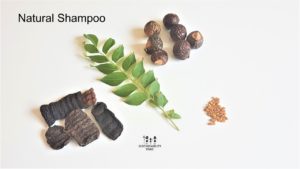
Watch this video tutorial about how to use soapnuts.
2. Conditioner
The regular use of Shikekai shampoo doesn’t need conditioner. But once in a while, I use eggs as a conditioner or make some hair mask out of yogurt, aloe vera.
Scalp massage with coconut oil is also great, especially for dry skin, and then afterward if you use Shekekai shampoo, you won’t need a conditioner for hair plus the shine you get for your hair is unmatched by any store-bought product.
3. Makeup remover
I started learning classical Indian dance from a very young age. So I used to perform on stage in shows regularly during my childhood and the stage make-up was not a new thing for me. However, my mum was always particular about removing makeup thoroughly with coconut oil afterward. So now I use coconut oil almost every night to clean up my face even if it’s not makeup I am removing it could be removing just sunscreen or dirt and pollutant from the skin.
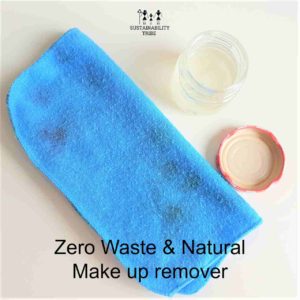
Coconut oil works wonders because of its antibacterial properties. Use the abrasive but soft washcloth to wipe the coconut oil from the face. I particularly use washcloths instead of cotton pads, not just washcloths reduce waste, and can be reused again and again, but also helps in removing excessive oil. After removing coconut oil, just wash the face with lukewarm water and no need to apply any moisturizer later. I have been using it during all seasons for a few years and so far this the best face cleansing, moisturizing, night cream, I could come up with.
4. Moisturizer & Body lotion
As mentioned in makeup remover above coconut oil is a great moisturizer that you can apply every night on your face. Apart from coconut oil; olive oil, ghee from the kitchen are great moisturizers too.
But honestly, the need of the moisturizer or body lotion arises because of the use of harsh soaps and chemicals on your body. It’s a great business idea for the companies who sell those best cleansing products, which make your skin dry and then the same companies sell moisturizer and body lotions.
So my suggestion is to assess first why your skin is so dry? Is it because of the harsh chemicals you use or because of constant exposure to airconditioning? Or is it food or hormones? If you anyways don’t find the root cause and act on it, it doesn’t matter how many lotions and potions you are smothering on your skin, your skin will remain dry.
I prefer moisturizing skin right when I am cleansing. So in winter, when my skin needs more moisturizing I cleanse face and body with quick DIY like gram flour, turmeric, and milk or cream. In summer, aloe vera is a great natural moisturizer.
5. Face mask, packs & Facials
The store-bought facemask and face packs were never my favorite. I haven’t yet tried a single non- herbal facial which uses products made by using state of art technologies. And the result, I am really happy and comfortable in my skin.
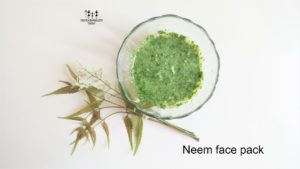
Over the years I have experimented with many different homemade face masks and face packs mainly by using ingredients from the kitchen or ayurvedic herbs. Not very pleasantly smelling neem face pack (ground neem leaves + yogurt) but oh boy it’s amazing in firming your skin. I love giving steam to my face once in a while and another tip is using motions when massaging and removing face packs.
You can read some of my favorite zero-waste face packs and hair masks.
6. Scrubs and Exfoliator
Most of the storebought exfoliators mainly contain plastic microbeads and they pollute our water bodies. It is really difficult to clean up microplastics from natural water bodies. But do you think, rubbing plastic microbeads on your skin can do any good? There are many natural alternatives available in your pantry. As simple as olive oil + sugar scrub or coffee ground + coconut oil; these are great exfoliator for the face as well as a full body. Lemon and orange peels are the best fruit exfoliators, if you dry them in sun and then crush to make powder, you can just add quick ingredients to create a scrub. Orange peel + yogurt to tighten the skin. Orange peel +turmeric +honey is great as an acne remedy and reducing tan.
If you don’t have enough time, then you can opt for dry brushing or use a natural loofah while taking a shower. Just make sure you buy a natural bamboo or wooden brush with natural bristles and loofah is all-natural, those are good for the environment and better for skin than any synthetic versions.
7. Toner and other skincare products
If you need to use products like toner, or products to close pores, etc; I have a very simple answer. Rosewater is great as a leave-in toner plus it smells great just make sure to find pure natural rosewater.
Cucumber is another great toner and so is the potato juice; cold milk is another great toner. You just need to wash it off after a few minutes. But again, if you are using natural exfoliating and cleansing, you won’t need a separate toner.
As I prefer basic, simple, and minimal skincare routine my top favorite is Besan-Haldi-milk (Garm flour +turmeric + milk). This multi-purpose beauty regime covers exfoliating, cleansing, toning, and moisturizing all in just one simple DIY recipe.
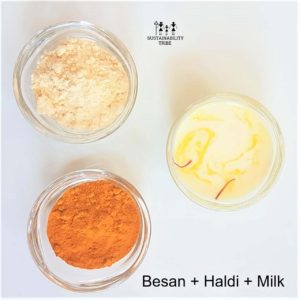
My principle is if you don’t bother your skin and hair much and accept them as is, they won’t bother you as well. If you try to change the color, texture, age of your skin by using irritating chemicals, or if you give too much heat to your hair, do regular blow-dry, keep changing hairstyle with curls or straightening and use too many sprays, etc. Then you don’t need a fortune teller to tell you what will be the outcome in a few years.
As we age, our skin and hair get more sensitive. The secret of keeping skin and hair healthy is not to bombard with harsh chemicals and toxins in your youth when you don’t see the immediate effects. You can not start caring for your skin and hair after you turn 30, you need to start early.
8. Toothpaste and Mouth Wash
Neem is one of the best natural toothcare herbs. Neem fights germs, maintains the alkaline levels in your saliva, keeps bacteria at bay, treats swollen gums, and also gives you whiter teeth. In olden days in India, people used to chew on neem twig or bark and use it as a toothbrush. We tried that during one of our camping trips and it worked well. It’s just we are so used to feeling fresh after using typical toothpaste and mouthwash that it’s somewhat more challenging to look at the alternative tooth care routine.
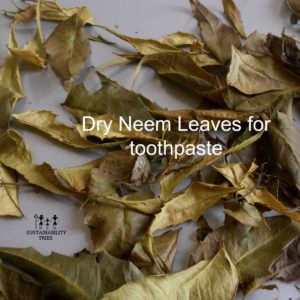
Oil pulling is gaining popularity these days, I tried but couldn’t do it every day. Instead, I found a great recipe for home-made toothpaste. Clean and sundry neem leaves. Crush the dried neem leaves to make a coarse powder. Add coconut oil to the neem powder and your toothpaste is ready. You can also add the dried mint powder to it for a fresh taste.
Also, don’t forget to opt for a natural bamboo toothbrush with natural bristles instead of the plastic version. For mouth wash, salt + water is great as a quick option. You can also make a mouth wash using below ingredients salt + baking soda + few drops of peppermint or clove essential oil + distilled water.
You can find here some more DIY mouth wash recipes by Dr. Steven Lin
9. Laundry Detergent
Natural soapnut is my go-to detergent, it’s much healthy on the skin, does not pollute natural water bodies, and is great on fabric so much that clothes last longer. They are really easy to use, just take 5 to 8 soap nuts berries and keep them in a small cotton pouch, toss the pouch in a full load of any kind of washing machine. In winter, remember to keep the water temperature on the warmer side, as the warm water helps to create lather out of soapnuts. Alternatively, you can boil the soapnuts and throw the soapnuts and warm water in the washing machine. The berries contain saponin which is a surfactant that can be used as soap.
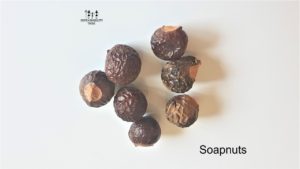
The best part is soapnuts can be reused at least 3-4 times before they start breaking down. You can then dry them and make a powder and use it again. In the end, you can just compost them. Now, soapnuts only clean your clothes, for whitening and stain removal you need to try other DIY recipes like soapnuts with vinegar or lemon juice for stain removal.
One point to remember here, it also important to select clothes made our of natural fabric, not just soapnuts work better with natural fabric but also the natural fabric is better for the skin. If you use natural fiber fabrics over synthetic fabric you are also reducing microplastic plastic pollution. Read further about reducing microplastic pollution.
10. Household Cleaning products
I also don’t buy specialty cleaning products like over and microwave cleaning, air fresheners. You can use lemon and orange peels directly as cleaning products including washing up your plates along with baking soda. You can create your cleaning products out of white vinegar, baking soda, lemon juice, essential oils, there are many DIY recipes found on the internet.
Read here some ideas about using lemon and orange peels to clean oven, microwave, as a deodorizer, and to create natural potpourri. Also, remember to use a natural sponge for dishes, in India people still use coconut fibers as dish sponge.
Especially for household and kitchen cleaning, it is much more important to use natural alternatives, as the store-bought cleaning products have concentrated chemicals. These products leave toxin residues on our plates and kitchen utensils. The cleaning products also emit VOCs (volatile organic compounds) in air and reduces the indoor air quality of our homes.
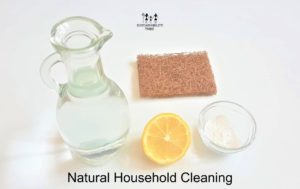
If you are new to natural personal care, I will suggest don’t force yourself to switch completely to zero waste beauty regime in one go. Start with one simple change at a time, check results on your hair or skin, and slowly you can shift to these natural alternatives. Honestly, for me sometimes life takes over and I need to have some convenient options. So, in that case, I try to buy products which are made from natural material and are as much package free. I have listed places in my zero waste shopping guide where you can also refill some great cleaning products. In such cases, I recommend a multipurpose cleaner for home, which can be used for many different applications.
You also might like my Top 10 Zero waste beauty DIY, which not only gives you great natural beauty recipes but also are great zero waste swaps.
